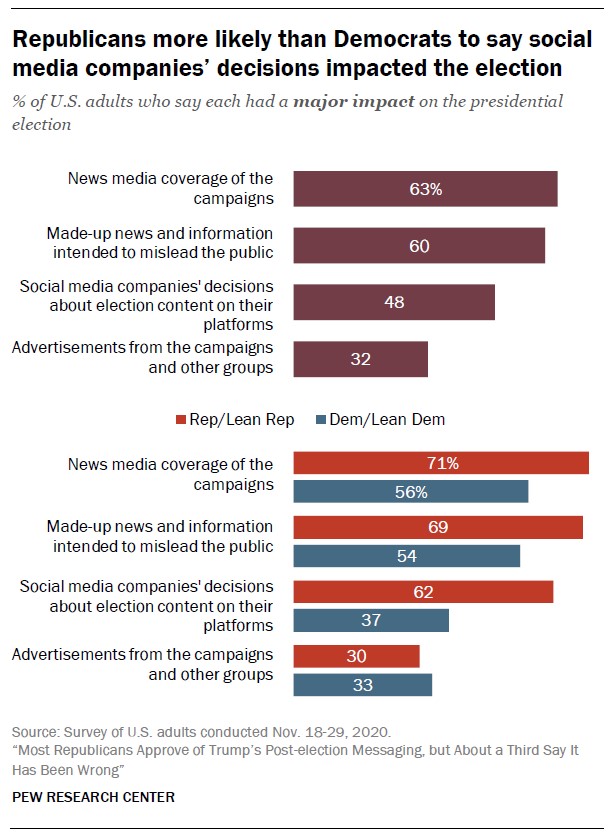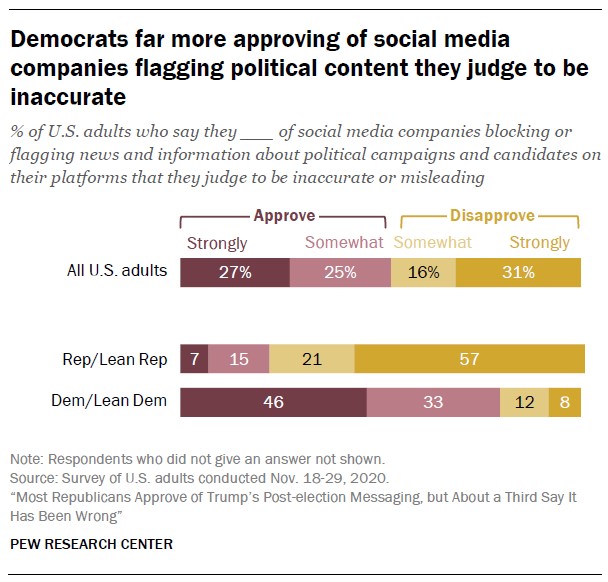Decisions made by social platforms regarding election content drew the ire of people on both sides of the political spectrum, but a new report from Pew Research Center found that Republicans were far more likely to be critical.
Pew surveyed 12,648 U.S. adults between Nov. 18 and 29, with respondents from its American Trends Panel weighted to be representative of the U.S. adult population by gender, race, ethnicity, partisan affiliation, education and other categories.
Overall, 60% of respondents believe made-up news and information had a major impact on the 2020 presidential election, while 63% believe new media coverage had a major impact.
Turing to social networks, 48% of respondents believe the decisions made by those platforms on election content had a great effect on the results, with 32% feeling the same way about campaign ads.
Republicans were far more likely than Democrats to say that decisions by social media companies had a major impact on the election, at 62%, compared with 37%.
The same partisan divide surfaced when asked whether news media coverage (71% of Republicans, 56% of Democrats) and made-up news (69% and 54%, respectively) impacted the vote.
Respondents were largely divided on social platforms’ decisions to block or flag election news and information that they believed to be inaccurate or misleading, with 51% approving and 47% disapproving.
However, along party lines, 78% of Republicans disapproved of decisions by social networks.
A total of 60% of respondents believe made-up news and information had a major impact on the election, with Democrats and Republicans both overwhelmingly seeing it as affecting their own party.


Other findings from Pew’s new report included:
- 91% of Democratic respondents believe President-elect Joe Biden has been delivering the right message since the election ended, while outgoing President Donald Trump has been delivering the wrong message.
- Republicans who disagree with Trump’s post-election messaging are more likely to be young adults, have college degrees and be Hispanic. Republicans who describe their political ideology as moderate or liberal are far more likely to disapprove of Trump’s messaging than conservative Republicans, at 51% versus 20%.
- One-half of respondents know that in modern history, there has never been a case of a losing presidential candidate refusing to publicly concede prior to Inauguration Day, but this, too, was split along party lines, with 64% of Democrats correctly answering this question, compared with 36% of Republicans.
- 42% of respondents believe allegations of voter fraud have received too much attention, while 31% said they have received too little attention and 25% saw it as about the right amount. This, too, was split on party lines, with 58% of Republicans believing these allegations received too little attention (compared with just 8% of Democrats), 22% saying they received the right amount (versus 28% of Democrats) and just 18% saying they received too much attention (compared with 63% of Democrats).
- Asked about the news media overall, 69% of Democrat respondents said it provided largely accurate coverage after the polls closed, compared with just 18% of Republicans.
- One-half of Democrats believe the news sources they turned to did very well at explaining the process of counting votes after the polls closed, versus just 16% of Republicans.
- The share of respondents paying close attention to Covid-19 remained largely unchanged from mid-October through late November, with 37% following it very closely—47% of Democrats, versus 28% of Republicans.
- Far more Democrats (45%) than Republicans (21%) changed their Thanksgiving plans due to the pandemic, as Republicans (56%) were fare more likely than Democrats (13%) to say that the pandemic has been exaggerated (although that Republican number has slipped by roughly five percentage points in recent weeks).
https://www.adweek.com/digital/republicans-express-displeasure-with-social-platforms-handling-of-political-content/

